I read about how TreeSet is slower than HashSet, (that adding elements into a TreeSet is slower) so i made a performance test, i'm trying to find out if it's better to add elements to HashSet and then move them into a TreeSet or put them in there in the first place. It looks like that inserting elements into a HashSet is faster but only when i insert a large amount of elements, why? I've read that if i don't need the elements sorted, always use HashSet, but apparently, sometimes it's slower.
When I insert a concrete value("1") instead of random numbers, TreeSet is also faster because there is no sorting, so how can i know when to use HashSet or TreeSet?
And my second question, when i create TreeSet like this, why don't i have access to "NavigableSet" methods?
Set<Integer> treeSet = new TreeSet<Integer>(); //cant type treeSet.lower(e: E)
TreeSet<Integer> treeSet = new TreeSet<Integer>(); //can type treeSet.lower(e: E)
Thanks for helping me with this.
Here are the results:
5 000 000 (random numbers)

5 000 000 (numbers "1")

500 000 (random numbers)

50 000 (random numbers)

Here is my code:
package performancetest;
import java.text.DecimalFormat;
import java.util.HashSet;
import java.util.InputMismatchException;
import java.util.Scanner;
import java.util.TreeSet;
public class HashSet_vs_TreeSet {
private static DecimalFormat df = new DecimalFormat("#.#####");
private static double hashTime, treeTime, hashToTreeTime;
private static int numbers = 0;
public static void main(String[] args){
start();
hashSetTest();
treeSetTest();
fromHashToTreeSet();
difference();
}
/**
* in this method, instead of "System.exit(1)" i try'ed "start()" but when i did lets say three mistakes, after correct input the
* methods hashSetTest();treeSetTest();fromHashToTreeSet();difference(); were running 4 times... i made this method exactly for the
* purpose to repeat itself in case of a input mistake.
*/
public static void start(){
System.out.print("Enter a number(a advise bigger or equal to 50 000): ");
Scanner scan = new Scanner(System.in);
try{
numbers = scan.nextInt();
}catch(InputMismatchException e){
System.out.println("ERROR: You need to enter a number");
System.exit(1);
}
System.out.println(numbers + " numbers in range from 0-99 was randomly generated into " +
"\n1)HashSet\n2)TreeSet\n3)HashSet and then moved to TreeSet\n");
}
public static void hashSetTest(){
/**
* i try'ed HashSet<Integer> hashSet = new HashSet<Integer>();
* but changing the load factor didn't make any difference, what its good for then ?
*/
HashSet<Integer> hashSet = new HashSet<Integer>(5000,(float) 0.5);
double start = System.currentTimeMillis() * 0.001;
for (int i = 0; i < numbers; i++) {
hashSet.add((int)(Math.random() * 100));
}
hashTime = (System.currentTimeMillis() * 0.001) - start;
System.out.println("HashSet takes " + df.format(hashTime) + "s");
}
public static void treeSetTest(){
TreeSet<Integer> treeSet = new TreeSet<Integer>();
double start = System.currentTimeMillis() * 0.001;
for (int i = 0; i < numbers; i++) {
treeSet.add((int)(Math.random() * 100));
}
treeTime = (System.currentTimeMillis() * 0.001) - start;
System.out.println("TreeSet takes " + df.format(treeTime) + "s");
}
public static void fromHashToTreeSet(){
HashSet<Integer> hashSet = new HashSet<Integer>();
double start = System.currentTimeMillis() * 0.001;
for (int i = 0; i < numbers; i++) {
hashSet.add((int)(Math.random() * 100));
}
TreeSet<Integer> treeSet = new TreeSet<Integer>(hashSet);
hashToTreeTime = (System.currentTimeMillis() * 0.001) - start;
System.out.println("TreeSet from HashSet takes " + df.format(hashToTreeTime) + "s");
}
public static void difference(){
double differenceSec = 0;
double differenceTimes = 0;
if(hashTime < treeTime){
differenceSec = (treeTime - hashTime);
differenceTimes = (treeTime / hashTime);
System.out.println("\nHashSet takes " + df.format(differenceSec) + "s less then TreeSet, it is " + df.format(differenceTimes) + " times faster");
}else{
differenceSec = (hashTime - treeTime);
differenceTimes = (hashTime / treeTime);
System.out.println("\nTreeSet takes " + df.format(differenceSec) + "s less then HashSet, it is " + df.format(differenceTimes) + " times faster");
}
}
}